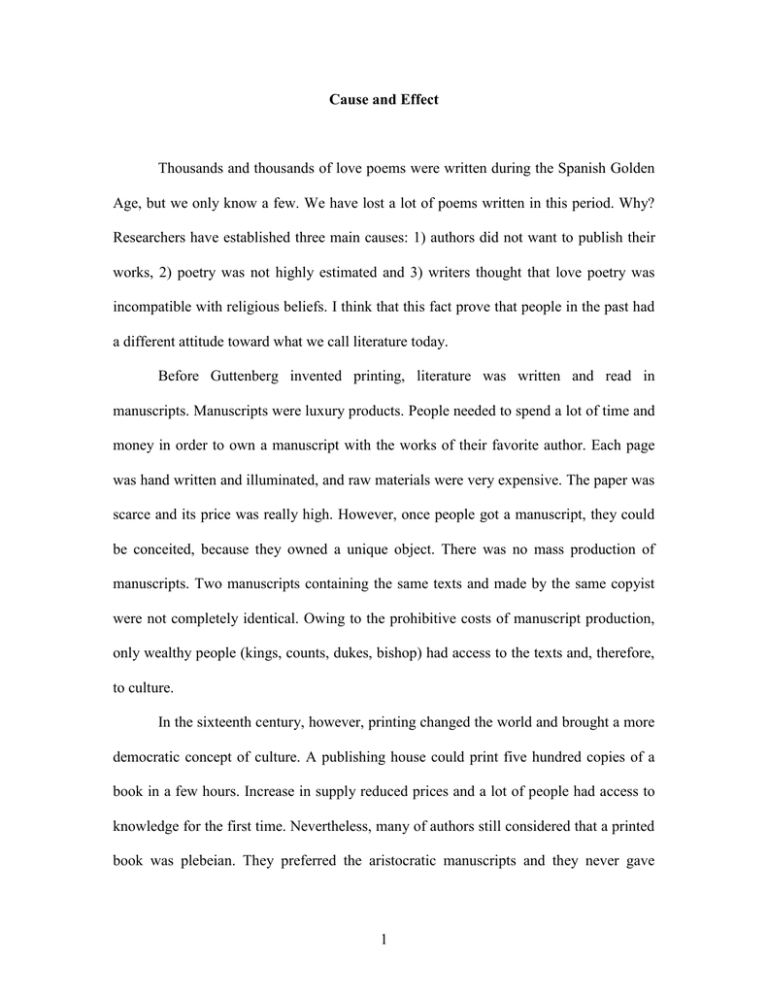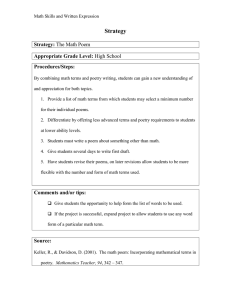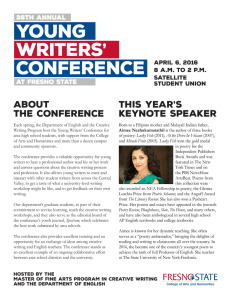Thousands and thousands of love poems were written during the... Age, but we only know a few. We have lost... Cause and Effect
advertisement

Cause and Effect Thousands and thousands of love poems were written during the Spanish Golden Age, but we only know a few. We have lost a lot of poems written in this period. Why? Researchers have established three main causes: 1) authors did not want to publish their works, 2) poetry was not highly estimated and 3) writers thought that love poetry was incompatible with religious beliefs. I think that this fact prove that people in the past had a different attitude toward what we call literature today. Before Guttenberg invented printing, literature was written and read in manuscripts. Manuscripts were luxury products. People needed to spend a lot of time and money in order to own a manuscript with the works of their favorite author. Each page was hand written and illuminated, and raw materials were very expensive. The paper was scarce and its price was really high. However, once people got a manuscript, they could be conceited, because they owned a unique object. There was no mass production of manuscripts. Two manuscripts containing the same texts and made by the same copyist were not completely identical. Owing to the prohibitive costs of manuscript production, only wealthy people (kings, counts, dukes, bishop) had access to the texts and, therefore, to culture. In the sixteenth century, however, printing changed the world and brought a more democratic concept of culture. A publishing house could print five hundred copies of a book in a few hours. Increase in supply reduced prices and a lot of people had access to knowledge for the first time. Nevertheless, many of authors still considered that a printed book was plebeian. They preferred the aristocratic manuscripts and they never gave 1 permission to print their works. Unfortunately, this behavior led to a mistake. In the following centuries, many books disappeared or were destroyed in fires, wars or natural catastrophes, or their pages were simply utilized to wrap the lunch. Printed books survived, because there were thousands of copies, but few manuscripts remained. Poetic justice? Today, authors long to sell as many copies of their books as possible. They want their books to appear on the best sellers list. But Renaissance writers did not, because they had a different concept of what we call ‘literature’ nowadays. Many Spanish authors did not pay attention to their own poetry in the seventeenth century. Actually, romance poetry was not considered art (in the modern sense of the word), but a useful technique in social life. Nobody called himself ‘poet’ in the seventeenth century. Writing poetry was not a job. As a matter of fact, although today writing poetry is considered a special ability or talent, it was not during the Spanish Renaissance. Everybody (i. e., everybody who had attended a university, because we cannot forget that most of the Spanish people were illiterate in this period) knew how to write a sonnet. When one was invited to a party (in a palace, for instance) he was supposed to wear appropriate clothes and to recite a poem in honor of his host or hostess. And, after the party, he could put clothes and his poem in the closet until the next party. We do not have these poems because nobody was interested in them. Actually, some of them were never written down, because they were just improvised ad hoc. Obviously, literature was not considered (as it is nowadays) a special gift during Spanish Renaissance. Finally, plenty of writers stopped writing poetry because they believed that love poetry was incompatible with religious life. Religious feeling was then stronger than 2 now. Actually, four hundred years ago, Catholicism was the state religion in Spain. When a person was excommunicated, he stopped being a citizen. In fact, religion had a strong ascendance over culture as a whole. For instance, Renaissance professors thought that there were only two literary genres: history and fiction. And fiction was considered a kind of lie and, therefore, a kind of sin. An intellectual exercise that was not directly related with religion was immediately considered harmful and wicked. The German and Spanish king Carlos the Fifth even asked his confessor for permission in order to write his autobiography. In this situation, it is understandable that many authors wrote their love poems when they were young and that they gave up love poetry as they grew older. Some of them regretted and even burnt their own writings. The mature wise author was supposed to write religious poetry, and not love poetry. Today, we usually think that people who write love poetry are quite sensitive and intelligent. However, in the seventeenth century, people who wasted their time writing love poems were not considered clever or smart at all. Actually, people thought that they were dim-witted and foolish. From the above, it may be deduced that people of the seventeenth century did not share our ideas about writers and their job. In the light of the facts above, we may conclude that people’s attitude toward literature has shifted a lot throughout the centuries. As a matter of fact, we know that, during the seventeenth century, Spanish people thought that literature was just a flippant game that religious, cultivated people should avoid. Probably, we would find many different concepts of literature as we would keep on researching people’s attitudes toward writers and texts across history. 3





